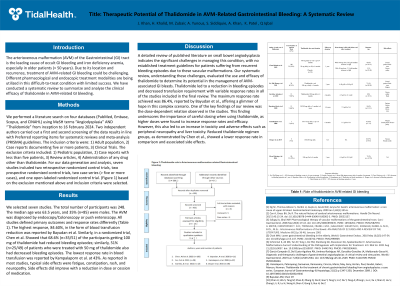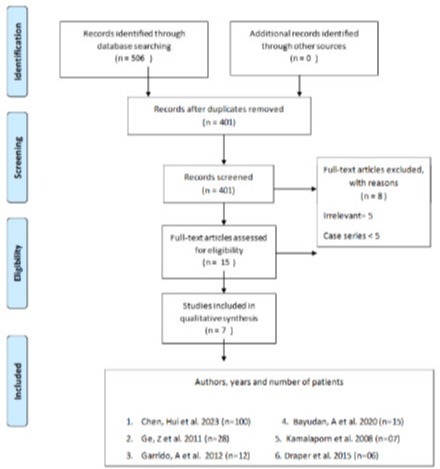Tuesday Poster Session
Category: GI Bleeding
P4187 - Therapeutic Potential of Thalidomide in AVM-Related Gastrointestinal Bleeding: A Systematic Review
Tuesday, October 29, 2024
10:30 AM - 4:00 PM ET
Location: Exhibit Hall E

Has Audio
- Jk
Junaid khan, MD
Tidal Health
Salisbury, MD
Presenting Author(s)
Junaid khan, MD1, Qamar Iqbal, MD1, Huzaifa Khalid, MD2, Zubair Ahmed, MBBS3, Samia Siddiqui, MBBS4, Adnan Younus, MD1, Aamir Asif Khan, MBBS5, Kunnal Patel, BS, MS6
1Tidal Health, Salisbury, MD; 2Tidal Health, Leesburg, VA; 3Fmhcmd, Jaranwala, Punjab, Pakistan; 4Tidal Health Peninsula Regional, Salisbury, MD; 5University Hospital Kerry, Tralee, Kerry, Ireland; 6Rowan-Virtua School of Osteopathic Medicine, Edison, NJ
Introduction: The arteriovenous malformation (AVM) of the Gastrointestinal (GI) tract is the leading cause of occult GI bleeding and iron deficiency anemia, especially in older patients ( > 50 years). Treatment of AVM-related GI bleeding could be challenging due to its location and recurrence. Different pharmacological and endoscopic treatment modalities are being utilized in this difficult-to-treat condition with limited success. We have conducted a systematic review to summarize and analyze the clinical efficacy of thalidomide in AVM-related GI bleeding.
Methods: We performed a literature search on four databases (PubMed, Embase, Scopus, and CINAHL) using MeSH terms “Angiodysplasia” AND “Thalidomide” from inception to 16 February 2024. After running the first and second screening of the data results by two independent authors in line with Preferred reporting items for systematic reviews and meta-analysis (PRISMA) guidelines. For our data generation and analysis, we selected two retrospective randomized control trials, two prospective randomized control trials, two case series ( > 5 or more cases), and one open-labeled randomized control trial. (Figure 1)
Results: We selected seven studies. (Table 1). The total number of participants was 248. The median age was 63.5 years, and 35% (n=85) were males. The AVM was diagnosed by endoscopy/Colonoscopy or push enteroscopy. Primary outcomes and response rates were defined differently in all studies (Table 1). The highest response, 84%, in the form of blood transfusion reduction was reported by Bayudan et al. Similarly, in a randomized trial, Chen et al. Showed that 68.6% (n=35/51) of the participants getting 100 mg of thalidomide had reduced bleeding episodes; similarly, 51% (n=25/49) of patients who were treated with 50 mg of thalidomide also had decreased bleeding episodes. The lowest response rate in blood transfusion was reported by Kampalaporn et al. at 43%. As reported in most studies, common side effects were fatigue, constipation, rash, and neuropathy. Side effects did improve with a reduction in dose or cession of medication.
Discussion: Thalidomide could potentially decrease bleeding episodes in recurrent GI bleeding from AVM.

Note: The table for this abstract can be viewed in the ePoster Gallery section of the ACG 2024 ePoster Site or in The American Journal of Gastroenterology's abstract supplement issue, both of which will be available starting October 27, 2024.
Disclosures:
Junaid khan, MD1, Qamar Iqbal, MD1, Huzaifa Khalid, MD2, Zubair Ahmed, MBBS3, Samia Siddiqui, MBBS4, Adnan Younus, MD1, Aamir Asif Khan, MBBS5, Kunnal Patel, BS, MS6. P4187 - Therapeutic Potential of Thalidomide in AVM-Related Gastrointestinal Bleeding: A Systematic Review, ACG 2024 Annual Scientific Meeting Abstracts. Philadelphia, PA: American College of Gastroenterology.
1Tidal Health, Salisbury, MD; 2Tidal Health, Leesburg, VA; 3Fmhcmd, Jaranwala, Punjab, Pakistan; 4Tidal Health Peninsula Regional, Salisbury, MD; 5University Hospital Kerry, Tralee, Kerry, Ireland; 6Rowan-Virtua School of Osteopathic Medicine, Edison, NJ
Introduction: The arteriovenous malformation (AVM) of the Gastrointestinal (GI) tract is the leading cause of occult GI bleeding and iron deficiency anemia, especially in older patients ( > 50 years). Treatment of AVM-related GI bleeding could be challenging due to its location and recurrence. Different pharmacological and endoscopic treatment modalities are being utilized in this difficult-to-treat condition with limited success. We have conducted a systematic review to summarize and analyze the clinical efficacy of thalidomide in AVM-related GI bleeding.
Methods: We performed a literature search on four databases (PubMed, Embase, Scopus, and CINAHL) using MeSH terms “Angiodysplasia” AND “Thalidomide” from inception to 16 February 2024. After running the first and second screening of the data results by two independent authors in line with Preferred reporting items for systematic reviews and meta-analysis (PRISMA) guidelines. For our data generation and analysis, we selected two retrospective randomized control trials, two prospective randomized control trials, two case series ( > 5 or more cases), and one open-labeled randomized control trial. (Figure 1)
Results: We selected seven studies. (Table 1). The total number of participants was 248. The median age was 63.5 years, and 35% (n=85) were males. The AVM was diagnosed by endoscopy/Colonoscopy or push enteroscopy. Primary outcomes and response rates were defined differently in all studies (Table 1). The highest response, 84%, in the form of blood transfusion reduction was reported by Bayudan et al. Similarly, in a randomized trial, Chen et al. Showed that 68.6% (n=35/51) of the participants getting 100 mg of thalidomide had reduced bleeding episodes; similarly, 51% (n=25/49) of patients who were treated with 50 mg of thalidomide also had decreased bleeding episodes. The lowest response rate in blood transfusion was reported by Kampalaporn et al. at 43%. As reported in most studies, common side effects were fatigue, constipation, rash, and neuropathy. Side effects did improve with a reduction in dose or cession of medication.
Discussion: Thalidomide could potentially decrease bleeding episodes in recurrent GI bleeding from AVM.

Figure: Figure 1: Thalidomide role in Arteriovenous malformation related Gastrointestinal bleeding
Note: The table for this abstract can be viewed in the ePoster Gallery section of the ACG 2024 ePoster Site or in The American Journal of Gastroenterology's abstract supplement issue, both of which will be available starting October 27, 2024.
Disclosures:
Junaid khan indicated no relevant financial relationships.
Qamar Iqbal indicated no relevant financial relationships.
Huzaifa Khalid indicated no relevant financial relationships.
Zubair Ahmed indicated no relevant financial relationships.
Samia Siddiqui indicated no relevant financial relationships.
Adnan Younus indicated no relevant financial relationships.
Aamir Asif Khan indicated no relevant financial relationships.
Kunnal Patel indicated no relevant financial relationships.
Junaid khan, MD1, Qamar Iqbal, MD1, Huzaifa Khalid, MD2, Zubair Ahmed, MBBS3, Samia Siddiqui, MBBS4, Adnan Younus, MD1, Aamir Asif Khan, MBBS5, Kunnal Patel, BS, MS6. P4187 - Therapeutic Potential of Thalidomide in AVM-Related Gastrointestinal Bleeding: A Systematic Review, ACG 2024 Annual Scientific Meeting Abstracts. Philadelphia, PA: American College of Gastroenterology.
